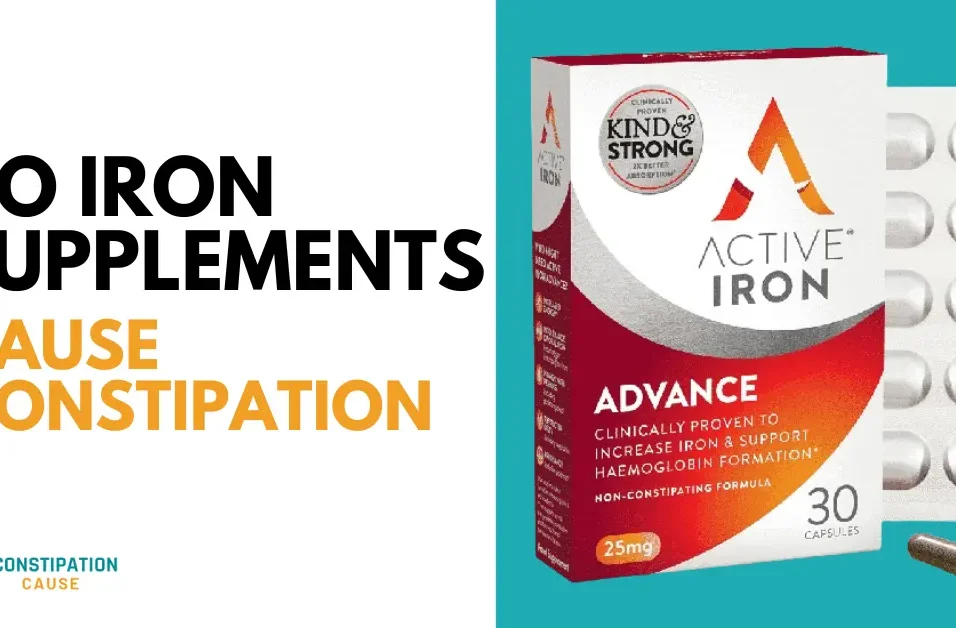Cinnamon, a beloved spice with a warm and delicious aroma, has not only found its way into our kitchens but our hearts as well.
However, as we savor the richness of this spice, a concern emerges – the potential link between cinnamon and constipation. As its popularity grows, so do questions about its potential impact on digestive health, making people more curious!
So, if you also have the same curiosity, then don’t worry because we have a detailed answer to your query. In this article we will help resolve the mystery, “Can cinnamon cause constipation?”
So, let’s get started!
Understanding Cinnamon and its Composition:
Cinnamon, beyond its enchanting taste and aroma, is a complex spice boasting a rich composition that contributes to its culinary and potential health benefits.
Components of Cinnamon:
1. Cinnamaldehyde:
At the heart of cinnamon’s distinct flavor and scent is cinnamaldehyde, a natural compound. This aromatic aldehyde not only provides the spice with its signature warmth but also exhibits antioxidant properties that may contribute to health benefits.
2. Essential Oils:
Cinnamon contains essential oils, including eugenol and linalool, which contribute to its aromatic profile. These oils add layers of complexity to its flavor and aroma while potentially offering antibacterial and anti-inflammatory properties.
3. Cinnamic Acid:
Cinnamic acid, another key component, contributes to cinnamon’s characteristic taste. This compound has been studied for its potential role in reducing inflammation and oxidative stress in the body.
4. Polyphenols:
Cinnamon is rich in polyphenols, plant-based compounds with antioxidant properties. These polyphenols, including procyanidins and catechins, contribute to the spice’s potential health-promoting effects.
Is cinnamon good for constipation?
Cinnamon is generally not considered a direct remedy for constipation, but it may offer some potential benefits for digestive health. Here’s how:
- Potential Digestive Benefits: Cinnamon contains compounds with antioxidant and anti-inflammatory properties, which may contribute to overall gut health.
- Blood Sugar Regulation: Some studies suggest that cinnamon may help regulate blood sugar levels. Stable blood sugar levels can indirectly support digestive function.
- Warming Properties in Traditional Medicine: In Ayurveda and Traditional Chinese Medicine, cinnamon is valued for its warming properties. This warmth is believed to stimulate digestive fire (Agni) and invigorate the digestive system.
- Flavorful Addition to Fiber-Rich Foods: Cinnamon can enhance the flavor of fiber-rich foods, such as oatmeal or fruits. A diet high in fiber is known to promote regular bowel movements.
Can Cinnamon Cause Constipation in Babies?
Introducing cinnamon to a baby’s diet should be approached cautiously. While cinnamon is generally safe for babies in small amounts, excessive consumption may potentially impact digestion. Babies have sensitive systems, and new foods, including spices, should be introduced gradually and monitored for any adverse reactions. Consulting with a pediatrician before incorporating cinnamon into a baby’s diet is advisable to ensure it aligns with the child’s developmental stage and individual health considerations.
Can Cinnamon Be Used as a Laxative?
Cinnamon is not typically used as a direct laxative, but it may have mild digestive benefits. The warming properties of cinnamon, as per traditional medicine, might stimulate digestion. However, it’s crucial to note that cinnamon should not be seen as a substitute for traditional laxatives. Its effects can vary among individuals, and excessive consumption may lead to digestive discomfort. Using cinnamon in moderation as part of a balanced diet may offer subtle digestive support.
Is Cinnamon Tea Good for Constipation?
Cinnamon tea, when consumed in moderation, may provide mild digestive benefits due to its potential anti-inflammatory properties. The warmth of cinnamon is traditionally associated with stimulating digestion. While it may contribute to overall gut health, it’s essential to emphasize that maintaining a balanced diet, proper hydration, and sufficient fiber intake are key factors in preventing constipation. Cinnamon tea can be part of a holistic approach to digestive well-being.
Can Too Much Cinnamon Make You Poop?
Excessive consumption of cinnamon may have a laxative effect for some individuals due to its warming properties. However, it’s crucial to practice moderation. Consuming large amounts of cinnamon can lead to other digestive discomforts, and individual responses vary. It’s recommended to enjoy cinnamon in reasonable amounts as part of a varied and balanced diet to avoid potential adverse effects on digestion. Some people face digestive issues caused by cocaine. Check out does cocaine cause constipation?
Cardamom and Heart Palpitations:
Cardamom is generally considered safe for consumption, and there is no strong evidence linking it directly to heart palpitations. However, individual responses and sensitivities vary. Excessive consumption or individual allergies may lead to discomfort. If someone experiences concerns about heart palpitations or other health issues related to cardamom consumption, it’s advisable to consult with a healthcare professional for personalized advice and assessment of individual health conditions.
Types of Cinnamon and Their Differences:
Cinnamon, a spice synonymous with warmth and flavor, unfolds into a nuanced narrative when we explore its diverse varieties. Understanding the differences between Ceylon and Cassia cinnamon provides not only a culinary adventure but also considerations for health-conscious choices.
1. Ceylon Cinnamon:
- Origin and Flavor: Hailing from Sri Lanka, Ceylon cinnamon is often dubbed “true cinnamon.” It offers a delicate, subtly sweet flavor, making it a prized choice in gourmet cuisine.
- Appearance: Ceylon cinnamon has thin, fragile bark that forms multiple layers when rolled, distinguishing it from the thicker bark of Cassia cinnamon.
- Coumarin Content: Ceylon cinnamon contains significantly lower levels of coumarin, a compound that, in excess, may have potential health concerns.
2. Cassia Cinnamon (Cinnamomum cassia):
- Origin and Flavor: Cassia cinnamon, more widely available, originates from China and Southeast Asia. It has a stronger, spicier taste compared to Ceylon cinnamon, making it popular in many commercial products.
- Appearance: Cassia cinnamon has a thicker, rougher bark and forms a single layer when rolled.
- Coumarin Content: Cassia cinnamon contains higher levels of coumarin, contributing to its robust flavor but necessitating caution in excessive consumption.
Considerations for Choosing the Right Type:
1. Flavor Preferences:
Delicate or Robust: Choose between the delicate, sweet notes of Ceylon cinnamon or the bold, spicy character of Cassia based on your culinary preferences.
2. Health Considerations:
Coumarin Sensitivity: Individuals with concerns about coumarin levels may opt for Ceylon cinnamon, which has a lower content of this compound.
3. Culinary Applications:
Gourmet vs. Everyday Use: Ceylon cinnamon, with its refined flavor, may be preferred for gourmet dishes, while Cassia cinnamon is versatile for everyday cooking and baking.
4. Availability and Cost:
Widely Available vs. Specialty: Cassia cinnamon is more readily available and cost-effective, while Ceylon cinnamon is often considered a specialty item and may be pricier.
Cinnamon in Culinary and Medicinal Uses:
Cinnamon, with its captivating aroma and versatile flavor profile, transcends its role as a mere spice; it is a culinary and medicinal treasure trove, enriching both the kitchen and the apothecary.
1. Sweet Concoctions:
Cinnamon shines in sweet creations, elevating desserts with its warm, comforting notes. From cinnamon rolls and apple pies to snicker doodle cookies, it imparts a distinctive flavor that lingers on the palate.
2. Savory Infusions:
In savory dishes, cinnamon adds depth and complexity. It’s a key player in Middle Eastern and Indian cuisines, where it graces dishes like biryanis, curries, and spiced meats, imparting a hint of sweetness.
3. Beverage Elegance:
Cinnamon finds its way into a variety of beverages. Whether as a comforting addition to hot chocolate, a flavorful accent in chai tea, or a subtle enhancement in cocktails, its versatility knows no bounds.
4. Spice Blends and Seasonings:
Cinnamon is a staple in spice blends, such as pumpkin spice and garam masala, contributing to the aromatic symphony that defines these mixes. It also complements various seasonings in both sweet and savory dishes.
On the other hand, most common question do taking steroids make you constipated. If you’re one of them who have this problem then check this post.
Discussion on Traditional and Modern Medicinal Applications:
1. Historical Remedies:
Cinnamon has a storied history in traditional medicine. Ancient civilizations, including those in China and Egypt, utilized it for its potential health benefits. It was valued for its warming properties and was believed to aid digestion.
2. Modern Research Insights:
Contemporary research delves into the medicinal potential of cinnamon. Studies suggest that its components, such as cinnamaldehyde and polyphenols, may possess antioxidant, anti-inflammatory, and antimicrobial properties. These properties contribute to its role in promoting overall health.
3. Blood Sugar Management:
Cinnamon has garnered attention for its potential role in managing blood sugar levels. Some studies suggest that it may enhance insulin sensitivity, offering a supportive element for individuals with diabetes.
4. Antimicrobial Effects:
Cinnamon’s antimicrobial properties have been explored in the context of combating infections. Its essential oils, particularly cinnamaldehyde, exhibit antibacterial and antifungal characteristics.
5. Anti-Inflammatory Potential:
The anti-inflammatory properties of cinnamon have implications for conditions related to inflammation, with some studies suggesting its potential in mitigating inflammatory responses in the body.
Cinnamon and Digestive Health:
Cinnamon, beyond its role as a culinary delight, has intrigued researchers with the potential impact it may have on the intricate dance of the digestive system. As we embark on this exploration, we delve into the aromatic splendor of cinnamon and its potential relationship with gut health.
1. Antioxidant Properties:
Cinnamon, rich in polyphenols and antioxidants, may play a role in supporting digestive health. These compounds have been studied for their ability to combat oxidative stress, which can affect the digestive organs.
2. Anti-Inflammatory Potential:
Inflammation in the digestive tract can lead to discomfort and digestive issues. Cinnamon’s anti-inflammatory properties, particularly attributed to cinnamaldehyde, may contribute to a soothing effect on the digestive system.
3.Balancing Gut Microbiota:
Emerging research suggests that cinnamon may influence the balance of gut micro biota. A healthy gut microbiome is crucial for digestion and overall well-being, and cinnamon’s potential prebiotic effects could contribute to this balance.
Review of Studies on Cinnamon and Gut Health:
1. Antimicrobial Effects on Gut Pathogens:
Studies have explored cinnamon’s ability to combat harmful gut pathogens. Its essential oils, known for their antimicrobial properties, may act as a natural defense against certain bacteria and fungi that can disrupt digestive harmony.
2. Potential for Easing Digestive Discomfort:
Some research suggests that cinnamon may have a soothing effect on the digestive tract, potentially easing discomfort associated with common digestive issues. This makes it an intriguing subject for those seeking natural ways to promote digestive well-being.
3. Blood Sugar Regulation and Digestive Harmony:
The potential impact of cinnamon on blood sugar regulation has broader implications for digestive health. By helping to stabilize blood sugar levels, cinnamon may indirectly contribute to maintaining digestive harmony.
Can Cinnamon Cause Constipation?
Cinnamon is not typically considered a direct cause of constipation. In fact, it is often celebrated for its potential health benefits and culinary versatility. Constipation can be influenced by various factors, including diet, hydration, and individual sensitivities.
Here are some considerations regarding cinnamon and constipation:
- Fiber Content: While dietary fiber is known to promote regular bowel movements, cinnamon is not particularly high in fiber. In moderate amounts, the spice is unlikely to contribute significantly to constipation.
- Hydration: Adequate hydration is essential for maintaining digestive health. Cinnamon, when used in cooking or beverages, may contribute to overall fluid intake, which can have a positive impact on digestive balance.
- Individual Sensitivity: People vary in their sensitivity to different foods and spices. While many individuals can incorporate cinnamon into their diets without issues, some may experience digestive discomfort. Paying attention to individual responses is crucial.
- Dosage and Frequency: The amount and frequency of cinnamon consumption can influence its potential effects on digestion. Moderate and occasional use is less likely to cause digestive issues compared to excessive or daily consumption.
- Combination with Other Ingredients: Cinnamon is often part of complex recipes or spice blends. The combination of ingredients can affect digestive responses. Some individuals may find certain combinations more easily tolerated than others.
- Pre-existing Conditions: Individuals with pre-existing digestive conditions, such as irritable bowel syndrome (IBS), may have varied responses to cinnamon. Those with sensitivities should consider consulting a healthcare professional for personalized guidance.
Factors Influencing Cinnamon-Induced Constipation:
While cinnamon is generally celebrated for its aromatic allure and potential health benefits, it’s prudent to acknowledge that individual experiences with the spice can vary. In this section, we delve into the nuanced factors that may influence whether cinnamon becomes a source of digestive discomfort, particularly in the context of constipation.
Factors That May Contribute to Constipation:
1. Individual Sensitivity:
Digestive Profiles: Individuals have different digestive profiles, and what suits one may not necessarily suit another. Some people may be more sensitive to certain spices, including cinnamon, leading to variations in digestive responses.
2. Pre-existing Digestive Conditions:
Irritable Bowel Syndrome (IBS): Individuals with pre-existing digestive conditions, such as IBS, may be more prone to experiencing digestive discomfort. Cinnamon, like many other foods, may need to be approached with caution in such cases.
3. Dietary Habits:
Overall Diet: The overall composition of one’s diet plays a crucial role. A diet rich in fiber, fluids, and varied nutrients can contribute to regular bowel movements and mitigate the risk of constipation.
4. Hydration Status:
Fluid Intake: Hydration is fundamental to digestive health. If cinnamon consumption is not accompanied by sufficient fluid intake, it may potentially contribute to dehydration, which is a known factor in constipation.
Managing Potential Digestive Issues with Cinnamon:
Some practical strategies and insightful tips to ensure that the aromatic warmth of cinnamon can be enjoyed without compromising digestive well-being.
Strategies for Those Who Experience Constipation with Cinnamon:
1. Moderation is Key:
Embrace moderation in cinnamon consumption. Rather than excessive doses, enjoy the spice in culinary creations in sensible amounts. This allows you to savor its flavor without overwhelming your digestive system.
2. Assessing Frequency:
Consider the frequency of cinnamon intake. If constipation is a concern, adjusting the frequency of consumption, such as enjoying cinnamon-infused dishes occasionally instead of regularly, may be beneficial.
3. Hydration Support:
Pair cinnamon consumption with adequate hydration. Ensure you’re drinking enough water throughout the day. Hydration supports overall digestive health and can counteract potential dehydration associated with certain spices.
4. Dietary Diversity:
Maintain a diverse and balanced diet. Integrate a variety of fruits, vegetables, whole grains, and other nutrient-rich foods into your meals. A well-rounded diet supports digestive regularity and can complement the occasional use of cinnamon.
Tips for Incorporating Cinnamon without Digestive Discomfort:
- Pairing with Fiber-Rich Foods:
- Use in Cooking Rather Than Supplements:
- Culinary Combinations:
- Listen to Your Body:
- Consult with a Healthcare Professional:
Incorporating Cinnamon into a Balanced Diet:
Cinnamon’s aromatic allure can seamlessly intertwine with a balanced diet, enhancing not just the flavor of dishes but also contributing potential health benefits.
- Sprinkle cinnamon generously over a bowl of oatmeal for a warm and comforting start to your day. This adds flavor without the need for excessive sugars, creating a wholesome breakfast.
- Infuse your smoothies with the aromatic notes of cinnamon. Whether in a banana-cinnamon blend or a berry-spiced concoction, it adds a flavorful twist without additional calories.
- Stir cinnamon into yogurt for a delightful and probiotic-rich snack. This combination not only tantalizes the taste buds but also supports gut health.
- When baking or selecting bread, opt for whole grain varieties. Add cinnamon to the dough for a fragrant twist, making your bread a nutritious canvas for both sweet and savory toppings.
- Savory Magic: Cinnamon isn’t limited to sweet applications. Experiment with adding a pinch to roasted vegetables or savory stews for a unique and aromatic layer of flavor.
- Warm Elixir: Elevate your tea experience by incorporating cinnamon sticks or ground cinnamon. This not only adds warmth but also introduces potential health benefits associated with the spice.
- When baking, consider reducing sugar content and enhancing flavor with cinnamon. It brings a natural sweetness, making it a versatile addition to various baked goods.
Conclusion
In summary, cinnamon is cherished for its flavor and potential health perks, but its effect on constipation varies. While it’s usually safe in moderation, those with sensitivities should be cautious. Staying hydrated, maintaining dietary variety, and consuming cinnamon in moderation are vital for digestive health. Seek guidance from a healthcare provider if you experience discomfort. Incorporating cinnamon into your diet can enhance flavors and offer health benefits, enriching your culinary experiences while supporting overall well-being.
Frequently Asked Questions
Can cinnamon cause constipation?
While individual responses vary, moderate cinnamon consumption is generally not associated with constipation. However, excessive intake may impact digestion.
How much cinnamon is safe to consume daily?
Optimal amounts vary, but a teaspoon (around 2.5 grams) per day is often considered safe for most adults. Individual tolerance and health conditions should be considered.
Are there specific types of cinnamon less likely to cause constipation?
Both Ceylon and Cassia cinnamon can be part of a balanced diet. Ceylon cinnamon is milder, potentially causing fewer digestive issues for some individuals.
Can cinnamon be used as a remedy for constipation?
Cinnamon is not a direct remedy for constipation. While it may have digestive benefits, addressing constipation involves a holistic approach including hydration and fiber-rich foods.
Are there any known allergies associated with cinnamon consumption?
Yes, some individuals may be allergic to cinnamon. Allergic reactions can range from mild to severe. It’s advisable to seek medical advice if allergic symptoms occur.
Can pregnant women safely consume cinnamon without the risk of constipation?
Pregnant women can enjoy cinnamon in moderation as part of a balanced diet. However, individual responses vary, and it’s recommended to consult with a healthcare professional for personalized advice during pregnancy.









Leave feedback about this